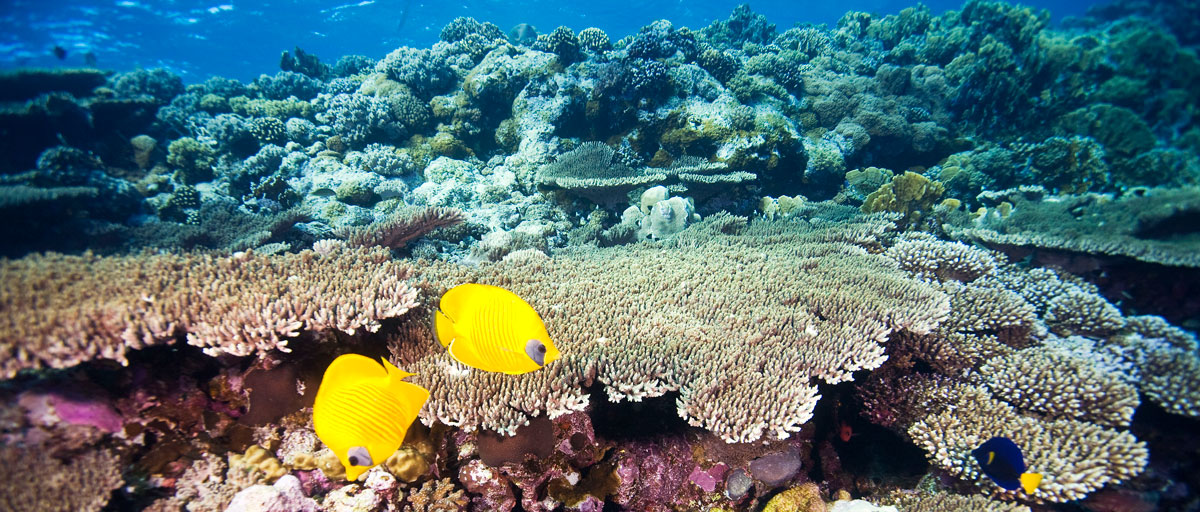
Reef corals such as staghorn corals have been damaged due to overfishing, disease and global warming. Novel systems formed in their absence requires a new thinking on management and conservation, a new study argues. Photo: B. Christensen/Azote
Coral reefs — Back to the future: Unrealistic to think coral reefs can return to pristine conditions, more pragmatic management approaches needed
Few, if any of the world’s coral reefs have been left untouched by humans. While it might still be possible to restore some damaged reefs to their historic function, a growing number of them may are now turning into “novel ecosystems”. Realising this might help researchers and managers to set up more sensible goals.
This is the conclusion by a team of scientists from the Stockholm Resilience Centre and James Cook University who recently published in Current Opinion in Environmental Sustainability.
“It is unfortunately unrealistic to think coral reefs can return to pristine conditions, realising this enables more pragmatic approaches to maintaining or re-building the dominance of corals,” explains centre researcher Albert Norström, one of the authors of the study.
One well-known example is how most Caribbean coral reefs have changed due to overfishing, disease and global warming. This has greatly reduced the abundance of large branching elkhorn and staghorn corals, which are very unlikely to become dominant again in the future. The novel systems formed in their absence are often dominated by leaf-like or plate-like corals.
Forward thinking research
Some fear that raising the issue of novel ecosystems might pave the way for a more laissez-faire attitude to conservation and restoration, that it could be misused and justify inaction. However, even though many coral reefs are changing beyond full repair they may still provide valuable goods and services, like fish production and shoreline protection.
Consequently, there is a need for forward-thinking research to understand the properties of these emerging ecosystems.
So far, most work on novel ecosystems has been done on land, but given the increasing human impact on a range of coastal and marine ecosystems, the scientists argue that a need to evaluate whether the concept is also applicable to the marine environment.
Embrace change
With coral reefs changing in unprecedented ways due to greenhouse gas emissions, overfishing, pollution and other threats, we must change our understanding of reefs as well, argue the authors of the new study. This means embracing change and exploring how human societies can adapt and respond to novel futures.
“We are by no means suggesting that current management and conservation activities should be abandoned, but rather highlight the need to re-evaluate our actions and goals,” explains centre researcher and co-author Magnus Nyström.
Novelty can mean hope
In some cases, novel coral reefs are not only a bad thing. For example, due to changes in temperature, reef corals in Japan have been extending their range northward at rates of up to 14 kilometres per year, generating new reef structures along these coastlines. Similar development has been seen in the Australian Great Barrier Reef and in the Caribbean. This will of course influence the already existing systems at these latitudes, but not necessarily only in the negative sense.
“The emergence of novel coral reef configurations gives some hope that coral reefs may persist if the grand challenges facing them are rapidly tackled,” the authors write.
Undoubtedly, coral reefs will look different in the future. Most likely, management and scientific research will need to change as well if we want to save some kind of reef-like systems and the services they might generate to us humans.
“Understanding what kind of coral reef configurations that are possible and how best to manage them represent major gaps in our current scientific understanding of coral reefs,” Albert Norström concludes.
Graham, N.A.J., Cinner, J. E., Norström, A.E., Nyström, M. 2013. Coral reefs as novel ecosystems: embracing new futures, Current Opinion in Environmental Sustainability, Volume 7, April 2014, Pages 9-14, ISSN 1877-3435, http://dx.doi.org/10.1016/j.cosust.2013.11.023

Albert Norström is research coordinator for the Programme on Ecosystem Change and Society (PECS) and is currently assessing and predicting regional coral reef resilience in the Hawaiian archipelago.

Magnus Nyström’s research is focused on the effects from human interventions, such as climate change, overfishing (including trade) and pollution, on ecosystem functions and processes – and how this impacts on resilience in ecological and social-ecological systems.